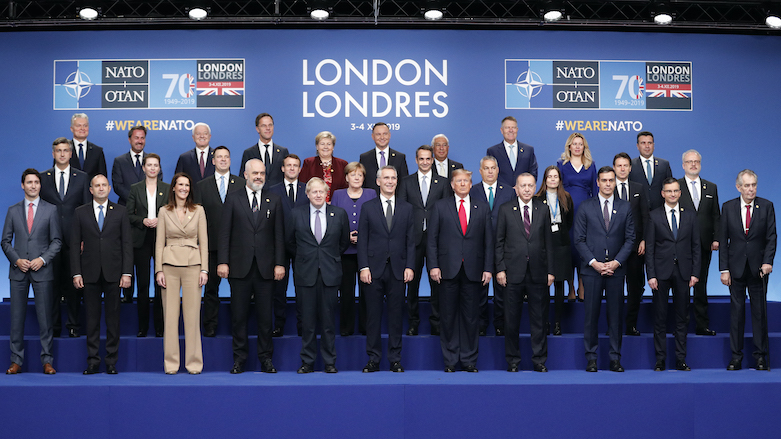Erdogan retreats on demand that NATO label YPG a terrorist group

WASHINGTON DC (Kurdistan 24) – Turkish President Recep Tayyip Erdogan approached the just-concluded meeting of NATO heads of state in London with the demand that NATO recognizes the Kurdish People’s Protection Units (YPG) as a terrorist organization, although the YPG has provided the leadership for the Syrian Democratic Forces (SDF), the Coalition’s main partner against the Islamic State in Syria.
If it did not do so, Erdogan threatened, Turkey would oppose NATO plans for the defense of the Baltic states and Poland. “If our friends at NATO do not recognize as terrorist organizations those we consider terrorist organizations,” Erdogan warned, “we will stand against any step that will be taken here.”
However, when the meeting ended on Wednesday, Erdogan had accepted the NATO plan—without securing his demand on the YPG. Perhaps, Turkey received some satisfaction from the wording of the conference’s final declaration, which stated, “Terrorism in all its forms and manifestations remains a persistent threat to us all.” That fell far short of Erdogan’s demand, however.
Although senior officials, including NATO Secretary General Jens Stoltenberg, were repeatedly asked about the change in Turkey’s position, they provided no explanation for it.
Dr. Aykan Erdemir, a former Turkish parliamentarian and now a Senior Fellow at the Foundation for Defense of Democracies, advised Kurdistan 24, “Erdogan’s blocking of NATO’s defense plans would have alienated a long list of member states.”
“Given Turkey’s diplomatic isolation” after attacking northeast Syria, “Erdogan refrained from further undermining Turkey’s standing within the transatlantic alliance,” he continued.
This shows “Erdogan’s tough talk is not always backed by tough action, especially if there is push-back from Turkey’s Western allies,” observed Erdemir.
“By blocking NATO’s plans for Poland and the Baltics, Erdogan would have been directly serving Russian interests in a manner that could have made Turkey’s future relations with NATO untenable,” Alan Makovsky, a Senior Fellow at the Center for American Progress, told Kurdistan 24. Makovsky cautioned this is unlikely to be the end of the matter, and we will “continue to see Turkey invoking the YPG issue as a threat inside NATO.”
Trump-Erdogan Meeting
Despite strong Congressional criticism of Trump’s accommodating posture toward Erdogan, Trump held a previously unscheduled meeting on Wednesday with the Turkish leader on the sidelines of the NATO conference.
It was their second meeting in less than a month. When asked by reporters afterward about it, Trump affirmed, “It was a very good meeting.”
“We discussed Syria. We discussed the Kurds. We discussed numerous things, and we’re getting along very well,” Trump said. He also defended his highly controversial decision to withdraw US forces from northeast Syria, enabling Turkey’s cross-border assault.
“The border and the safe zone is working out very well,” Trump affirmed. “The ceasefire is holding very much so.”
Nicholas Heras, a Fellow at the Center for New American Security, disputed that claim, however. “Turkey continues to press ahead with a slow burn campaign to expand the reach of its zone in northeast Syria,” Heras told Kurdistan 24.
“The fighting is far less intense now than over a month ago,” he added, “but Turkey has noticeably been using war drones to strike at the SDF in a manner that contradicts the ceasefire.”
Indeed, on Tuesday, sitting alongside Trump and speaking to the press before their meeting, French President Emmanuel Macron charged that Turkey was now “fighting against” those who had “fought with us, shoulder to shoulder, against ISIS.” And he, notably, added, “Sometimes [the Turkish forces] work with ISIS forces.”
Turkey’s S-400 Purchase
One of the biggest issues between the US and NATO, on the one hand, and Turkey, on the other, is its acquisition of the advanced Russian air defense system, the S-400. On Wednesday, when first asked about his meeting with Erdogan, Trump did not mention the S-400.
However, later in the day, before meeting with Italian Prime Minister Giuseppe Conte, Trump was asked directly, “Did you convince Erdogan to get rid of the S-400?”
“We talked about it a little bit. You’ll be hearing about it,” Trump said, before abruptly ending the exchange.
NATO Secretary General Jens Stoltenberg was also asked about Turkey’s acquisition of the S-400 in his closing press briefing.
“That’s a national Turkish decision. Many allies have expressed concerns, I have also expressed my concerns about the consequences of that decision,” Stoltenberg said. “A Russian air defense system, S-400, will never be integrated into NATO. It will never be part of the NATO integrated air and missile defense system.”
The Turkish media quoted Stoltenberg approvingly, because his statement was close to Turkey’s position. Ankara maintains that a “stand-alone” S-400 system would not be a threat to NATO.
However, Stoltenberg’s statement was of limited significance. It is the US that counts most on this issue. US officials have a different view, and they are adamantly opposed to Turkey’s operating the S-400 in any mode. Moreover, they seek to dissuade other countries from buying Russian military equipment, and how the US responds to Turkey’s weapons purchase will influence significantly the decisions of such countries.
Read More: US Senate will take up sanctions on Turkey, following NATO conference
The House of Representatives has already passed a bill imposing sanctions on Turkey for its S-400 purchase, and Sen. Jim Risch (R, Idaho), Chairman of the Senate Foreign Affairs Committee, has announced that his committee would start to move on similar legislation next week.
Editing by Karzan Sulaivany
